Filter by:
News
Stay informed of all the latest Deltares developments in the field of water and subsurface.
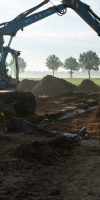
Bioreactor with woodchips reduces nitrogen levels in ditches
Do wood chips help to clean up water in ditches? A range of organisations and government authorities are currently investigating this issue in Westerbeek in the Dutch province of Noord-Brabant. The initial results are positive.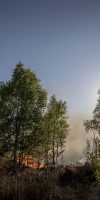
Already hundreds of wildfires annually in the Netherlands
The Netherlands has hundreds of wildfires every year. They are often small but the potential consequences are significant. A group of researchers led by Wageningen University & Research, working with wildfire experts from Deltares, the Dutch Fire Department, and the Spanish company Technosylva, has drawn up an overview of the numbers and impact of wildfires in the Netherlands for the first time since 1994, when official registration stopped.
Further elaboration of long-term sea level rise solutions
The Sea Level Rise Knowledge Programme, a national research programme of the Ministry of Infrastructure and Water Management and the Delta Commissioner, has had three lines of thought explored for long-term protection against extreme sea level rise: Seaward, Protect and Move with the sea. With all our knowledge, how can we continue our tradition of living and working safely with water in the future and what do we need to take into account now? Deltares contributed to these lines of thought with water system knowledge.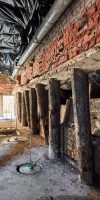
Foundation damage in the Netherlands mapped out for national approach to foundation problems
More and more Dutch people are being faced with damage to foundations. Foundations are sensitive to rising and falling land levels, as well as low groundwater levels and therefore dry conditions. Climate change is amplifying the problem. A new analysis by Deltares in collaboration with TNO that was commissioned by the Council for the Environment and Infrastructure (Rli) indicates that, in the short term, there are about 425,000 buildings with an expected technical lifespan of less than fifteen years. Just under a quarter of them are founded on wooden piles; the remaining buildings have shallow foundations.
New Deltalife: 'normal no longer exists'
A new issue of our Deltalife magazine has just come out this week. It features inspiring articles that focus on our mission: 'Enabling Delta Life'.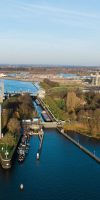
Water infrastructure future-proof replacement and renovation
How do we future proof our locks, dams, pumping stations and barriers? In the upcoming replacement or renovation task of wet engineering structures, we take into account the new climate scenarios from KNMI. Together with Rijkswaterstaat, Deltares is working on a set of starting points in the EUO-Kunst project, with the Oostsluis in Weurt as a pilot. This national monument is due for replacement and the more frequent low water levels of the river Waal will determine the threshold height of its successor.
From shoreface to dunes: integrated coastal modelling
Rising sea levels and increasing human activity is causing the pressure on coasts around the world to increase. Sandy solutions can safeguard water safety, recreation, and nature. The success of these natural solutions depends on their dynamic development, driven by water, wind, vegetation, and humans. An innovation in modelling now makes it possible to make even better predictions of the integral consequences of coastal solutions; from foreshore to dune. This was investigated by Deltares researcher Bart van Westen, together with other scientists.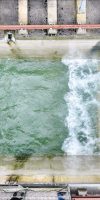
Deltares Deltaflume tests world's longest self-closing flood barrier
This week, Deltares' Deltaflume carried out wave tests to investigate the strength of a self-closing flood barrier that will be built along the renewed Scheldt quays in Antwerp. The self-closing flood barrier is hidden underground and rises only in cases of high water levels. The tests went well, which means that the concept of the self-closing dam is ready to protect Antwerp from flooding caused by storm tides on the Scheldt.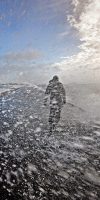
Understanding the influence of climate change on weather extremes and their societal impact
Attribution of the effect of global warming on (compound) weather extremes and their impacts is a key challenge in climate research. Within the new European project 'Compound extremes attribution of climate change: towards an operational service' (COMPASS), led by Deltares, a framework will be developed for climate and impact attribution of compound extremes.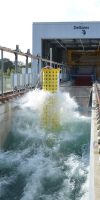
Protective measures offshore structures
What is the most suitable and cost-effective scour protection method for each situation? An overview of measures can now be found in the Handbook of Scour and Cable Protection Methods. This manual is the result of the multi-year research programme Joint Industry Project HaSPro, in which more than 20 companies worked together, initated and coordinated by Deltares.
How will our health change in the future? Creating knowledge-based scenarios
Our world is changing in terms of both climate and socio-economics. These changes could have a profound impact on the health of humans, animals and the environment, which in combination is often referred to as ‘One Health’. The recent paper ‘Creating the Dutch One Health Shared Socio-economic Pathways (SSPs)’ helps us to see where and when we should intervene.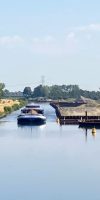
Cause of Juliana Canal construction pit failure determined
Rijkswaterstaat commissioned Deltares to investigate the cause of the failure of the construction pit on the Juliana Canal between Berg and Obbicht. The construction pit flooded in February 2023, two months after work began. It was determined that a combination of circumstances eventually led to underflow of the sheet piling (a flow of water through and/or under the sheet piling). Within seven minutes, the construction pit flooded with water from the canal.
